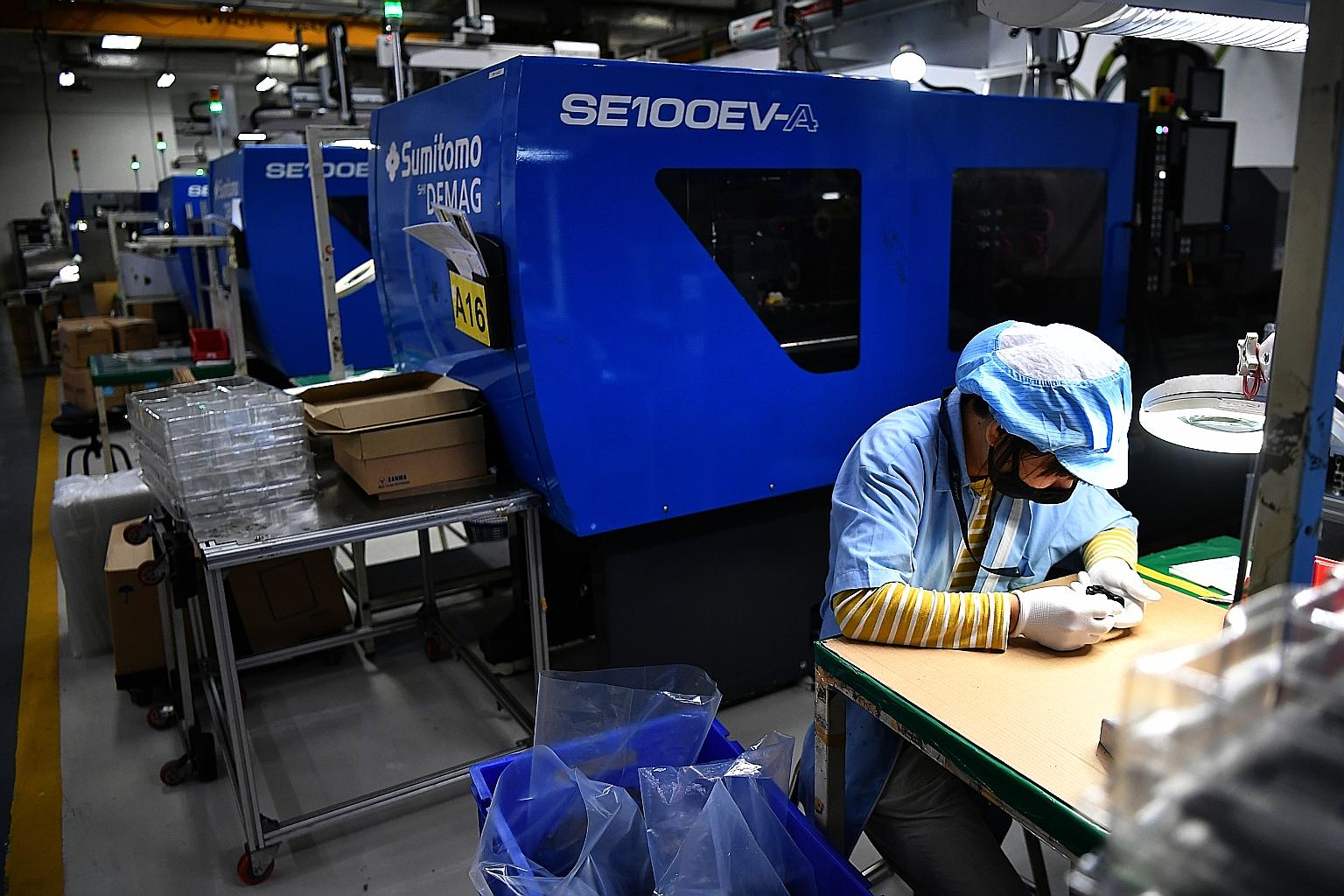STI shrugs off latest Covid-19 curbs; opportunities still on the cards for investors
Sign up now: Get ST's newsletters delivered to your inbox

A worker at plastics manufacturer Sanwa Plastic examining a product in the production area.
ST PHOTO: LIM YAOHUI
Follow topic:
SINGAPORE - The Singapore share market is taking the imposition of new Covid-19 restrictions in its stride if Wednesday's (July 21) results are any guide.
The Straits Times Index defied the general gloom over the tougher curbs on retail and dining out to close the day at 3,119, up 7.80 points or 0.27 per cent.
CapitaLand, Hongkong Land Holdings and Singapore Exchange were among the top gainers, but travel-related firms Singapore Airlines, Sats and Genting Singapore took a hit, while the three local banks held reasonably steady.
Some analysts think now is a good opportunity to take a closer look at the Singapore stock market given expectations of positive economic growth over the longer term.
While retail, food and beverage (F&B), hospitality and recreational businesses are likely to take a further hit from the tightened measures, the overall impact to the economy is not likely to be significant.
This is because manufacturing, which contributed 21.9 per cent to Singapore's gross domestic product (GDP) last year, and other major services clusters, such as finance and insurance, business services and information and communications, "may see little impact from the tightened measures", noted UOB economist Barnabas Gan.
CIMB Private Banking economist Song Seng Wun added: "The key driver for the Singapore economy are exports and manufacturing. This is a lot more significant than domestic demand in terms of GDP."
He said external demand is facing growing support from the reopening of key global economies such as the United States, Europe and China.
Dr Chua Hak Bin, economist at MayBank Kim Eng, warned that the rising number of Covid-19 cases in Asean could result in "possible disruptions to Singapore's manufacturing and food supply chain".
Mr Song agreed, noting that disruptions to local food supply following the restrictions imposed at Jurong Fishery Port and across Singapore's wet markets could lead to temporary price pressures.
He added the real estate sector may face a pullback as a result of the extended restrictions on F&B outlets that could lead to business closures.
Singapore has one of the highest vaccination rates in Asia, with 48 per cent of the population now fully vaccinated against Covid-19. Therefore, Mr Gan is maintaining his GDP growth outlook of 6.5 per cent for this year.
A buying opportunity is presenting itself for equity investors. "We don't think the heightened measures will dampen investor sentiment in the stock or property markets", said Dr Chua.
He said "the far more severe lockdowns last year had only a short-lived negative impact on the stock and property markets", adding that "investors will be looking more closely at the vaccination rate and anticipating some relaxation when the rate reaches two-thirds on National Day on Aug 9 or 75 per cent by the fourth quarter".
Ms Kong Ling Wei, a senior director at Colliers, said that despite the phase two (heightened alert) restrictions from May 16 to June 13, total property investment sales surged 86.3 per cent in the second quarter compared with the first three months of the year as investors took a longer-term view of their real estate investments.
DBS Vickers said there are opportunities for investors to buy stocks in sectors that could benefit from a domestic recovery, such as public transport, F&B and healthcare, as well as industrial, office and retail real estate investment trusts.

